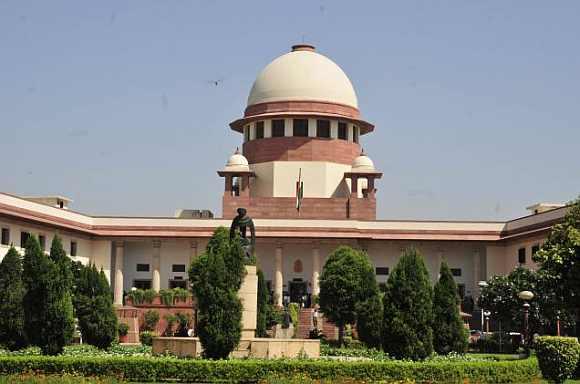'Experience of administration may make a member of civil service a good administrator but not necessarily an able and impartial adjudicator,' observes the Supreme Court.

The unseemly power struggle of politicians is there for all to see in the media.
But the hunger of the bureaucrats for authority is so subtle that it can be detected only in a clause or two in the law they draft -- like inserting ‘may’ in place of ‘shall’.
Shifting of a comma in a sovereign decree famously saved a criminal from the noose and in the United States cost billions of dollars in government revenue.
It requires the skill of judges to lay bare the effect of such slippery syntax.
Two Supreme Court judgments of recent weeks revealed how the babus yearn to wear the judicial hat in various tribunals.
This is an old game since the administrative tribunals were set up in the early 1990s.
The Supreme Court had written long judgments in which it insisted on a judicial member in such quasi-judicial bodies.
Installation of several tribunals has been stalled as the laws were drafted keeping out persons with adjudicatory experience and packing them with civil servants, mostly as sinecure for the retired.
The establishment of the company law tribunals, for instance, was delayed for years because the draftsmen tried to justify the weightage given to non-judicial members.
Their argument was that judges had no expertise in the emerging questions involving technology and economics.
Last month, the question arose again in the context of central and state regulatory commissions set up under the Electricity Act 2003.
The law stated that the chairperson of state commission “may” be a high court judge, and for the central commission a judge of the Supreme Court or the chief justice of a high court.
The clever hands of the draftsmen were seen in the use of the word “may”.
But when appeals were decided in the judgment (State of Gujarat vs Utility Users’ Welfare Association), the Supreme Court ruled that “may” should be read as “shall”.
It ruled that “it is mandatory to have a judicial mind presiding over these commissions in the form of a judge.”
Tribunals were set up to reduce the burden of regular courts and therefore they have been granted adjudicatory powers.
That brings in the constitutional concept of the independence of judiciary and the separation of powers.
Therefore, the court stated: “The presence of a man of law as a member is a necessity in order to sustain the provision, as otherwise, it would fall foul of the principles of separation of powers and judicial review, which have been read to be a part of the basic structure of the Constitution.”
Earlier this month, the court went a step further on the issue of appointments to tribunals in general.
The question arose in the case of debt recovery tribunals (Roger Mathew vs South Indian Bank).
Since the question of selection of members arises repeatedly, the theme of the new judgment was “restructuring of the tribunal system in the light of the constitutional scheme as interpreted in decisions of this court and expert studies”.
The court reiterated the observation in an earlier judgment that pointed out the incursion of civil servants into tribunals.
“Experience of administration may make a member of civil service a good administrator but not necessarily an able and impartial adjudicator,” the court said and added:
“There was gradual erosion of independence of judiciary and shrinking of the space occupied by the judiciary and increase in number of persons belonging to civil service discharging functions which were earlier exercised by courts which was needed to be checked.”
The government resisted the review of the existing procedure and provided fudged data regarding arrears in the debt recovery tribunals.
However, the court has asked it to set up a committee for overhaul of the entire system by framing the following issues: (i) Creation of a regular cadre and laying down eligibility for recruitment; (ii) Setting up of an autonomous oversight body for recruitment and overseeing the performance of the members; (iii) Amending the scheme of direct appeals to the SC and giving powers to high courts to hear appeals; and (iv) setting up more benches to make them more accessible to the public.
All these would require amendments to the existing laws which have created some 30 tribunals.
Since their functioning has not been satisfactory, some of them have been scrapped or merged.
Most are carrying on without the full quorum and a few are headless. The backlog is nearly as bad as ordinary courts and mounting.
There have been calls for scrapping the entire system, but surgical remedies should be tried before active euthanasia.










